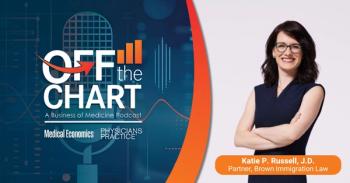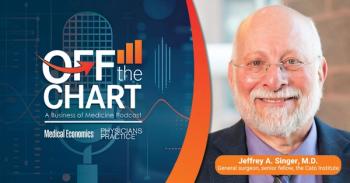
Dough or Diagnosis? Finding My Plan B
Cardiologist David Mokotoff feels at home whether he's prescribing a Mediterranean diet for his patients or snapper with orange brandy sauce for his family.
Like many things in life, I stumbled upon my “Plan B,” by accident. Growing up I was a picky eater. One day after turning up my nose at another meal, my mother said to me bluntly, “If you don’t like it, why don’t you make something yourself?”
Without giving it much thought, my independent streak took over and I responded, “Okay, I will.” At first it was just simple things like fried eggs, hamburgers, grilled cheese sandwiches, and spaghetti. To be fair, my mother did cook some things well, and I often watched in fascination as she made homemade applesauce through a food mill grinder, chicken soup with the smell of fresh dill permeating the house, and chopped liver and onions mashed in an old wooden bowl with a curved steel-blade utensil.
The real turning point came the summer of my senior year in high school. My parents insisted that I always have a summertime job, and I was burned out on being a lifeguard. Living in a small dairy town in rural New York offered limited opportunities for summer employment. My mother’s friend, and her husband, ran a summer camp for girls just outside of our town and were looking for a farm hand. I had little experience, but lots of enthusiasm. So, mounted on a Vespa motor scooter, I rode to the camp every morning where I cleaned the pool, drove a tractor, mowed grass, and watered down the horseback-riding area. Thankfully the campers were responsible for cleaning out the barn and stables. However, the place where I found real excitement was the kitchen.
The owner’s son had just graduated from Culinary Institute of America, or CIA, in New York City. Watching him prepare the meals from scratch for the entire camp was like watching an artist in motion. He was more than a willing teacher, and under his guidance, I learned how to create bread and pie dough, as well as real marinara sauce, which heretofore I'd only seen in a jar. I became proficient at dicing fruits and vegetables, and assisted in the preparation and roasting of various meats and poultry. Before long, my time spent in the kitchen was the pinnacle of my workday.
That fall I started college. Taking pre-med college classes, coupled with dorm and fraternity life, afforded me little time to expand my avocation. But, once I rented my own apartment, I ached to cook something more than Rice-A-Roni, or Hamburger Helper. In 1968, there was of course no Internet or Food Network Channel. Other than trial and error, my only resources were famous tomes like “The Fannie Farmer Cookbook,” or “The Joy of Cooking.”
Finally it was time to apply to medical school. My life had always been focused on one goal –– following my father’s footsteps as a physician or surgeon. In my mind, failure had never been an option. But, after my first two applications were rejected, I began to question my career choice. For the first time, I realized I had no back-up plan. Preparing for the worst-case scenario, I had nightmares about approaching my father for a loan to attend culinary school rather than medical school. Ultimately, that proved unnecessary.
Yet my passion for cooking has never faded. My first wife’s mother was an excellent cook but kept all three of her daughters out of the kitchen. So I taught her cooking and basic meal preparation. Years later, after we divorced, my second wife’s skill and passion for the culinary arts was equal to mine. We rarely ate dinner out –– preferring to have fun and experiment in the kitchen. She would make things like stone crab with pasta or moussaka. I would cook snapper with orange brandy sauce in paper or veal piccata. Following her untimely death in 2004, I would continue the tradition at home cooking meals for my daughters and their friends.
I am now married to an Italian-American woman who also loves to cook as much as I do. However, we couldn’t be more different in our approaches. I use recipes as a foundation and then branch off. She shuns them and views printed directions as a last resort. I am awed by her ability to whip up great cakes, pies, roasts, and vegetables without written instructions. We enjoy shopping, planning, and executing meals for family, company, and ourselves.
Being a cardiologist, I have always been conscious of dietary cholesterol and saturated fats in my cooking. But now I have somewhat modified this “low fat at all cost” obsession. I was struck by how often dieting failed in my patients, despite their best efforts. Looking for ways to help them succeed, I concluded no diet would work if people were hungry. I now advocate a healthy Mediterranean diet, and suggest they snack on fresh or dried fruits and nuts, rather than chips or pretzels.
After reading Michael Pollan’s “In Defense of Food,” and watching the disturbing documentary, “Food, Inc.,” my wife and I have also altered our approach to shopping and food preparation. We now shop and buy local produce: fish, grass-fed beef, poultry, and eggs whenever possible. I’m no longer convinced that margarine is better for one’s heart than real butter and I am certain that not all fats are bad.
During moments of frustration with what has happened to the practice of medicine over the past two decades, there have been times when I would dream what life would be like for me had I become a chef and not a doctor. In the end, I feel comfortable with what I am doing, and am glad that I have been able to help so many patients over my 31 years of practice. Being a chef I am sure has its own rewards and frustrations. At this point in my life, I feel comfortable that I have struck a proper balance between my work and a hobby.
At a time when too many Americans eat out five or six times a week, I fear that cooking and healthy food preparation may be a dying art. Sure there is a Food Network and Cooking Channel on television, but for most people it is relaxation and amusement, rather than inspiration. I take pride in knowing that I am passing down to my children knowledge and respect for not only good tasting foods, but ones that are healthy and sustainable as well.
David Mokotoff, MD, has been practicing cardiology for over 25 years in St. Petersburg, Fla. He is now semiretired in order to pursue his next passion, writing. You can view some of his works and blogs at
This essay was contributed as part of the November 2010 Physician Writer Search topic "The career I would have had if I hadn't become a doctor."
Newsletter
Optimize your practice with the Physicians Practice newsletter, offering management pearls, leadership tips, and business strategies tailored for practice administrators and physicians of any specialty.








